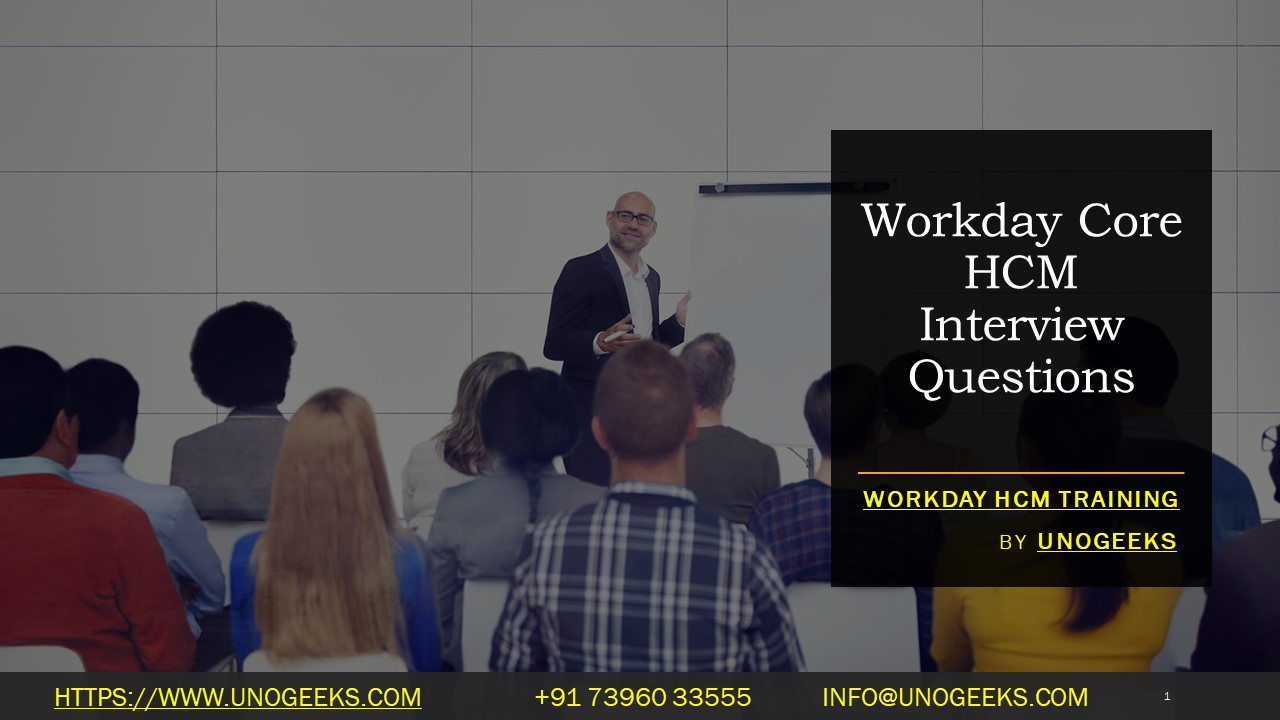Workday Core HCM Interview Questions
Types of Workday Core HCM Questions
- Conceptual Questions: Test your foundational knowledge of HCM and Workday concepts.
- Technical Questions: Assess your configuration and implementation skills.
- Situational Questions: Evaluate how you’d tackle real-world scenarios.
- Behavioral Questions: Focus on your communication, problem-solving, and adaptability.
Sample Questions and Answers
1. Explain the core components of Workday HCM.
Answer: Human Capital Management: Centralizes all employee data, processes, and self-service functions.
- Talent Management: Handles recruiting, onboarding, performance management, goal setting, and succession planning.
- Compensation: Manages salary structures, bonuses, equity plans, and benefits administration.
- Time Tracking and Absence Management: Tracks employee hours, time-off requests and accruals.
- Workforce Planning and Analytics: Provides dashboards, reports, and data-driven insights for workforce strategic decision-making.
2. What is a Business Process in Workday? How do you configure them?
Answer:A business process is a series of steps in Workday designed to accomplish an HCM task (e.g., hiring, onboarding, performance review). They ensure tasks follow your organization’s rules.
- Configuration steps:
- Define steps: Break the process into clear, actionable steps with responsible roles assigned.
- Set conditions: Use if/then logic for decision points and branching within the process.
- Establish approvals: Determine where and by whom approvals are needed.
- Security: Set security levels to control who can initiate and interact with the process.
3. Describe the difference between a Workday Supervisory Organization and a Workday Security Group.
Answer:Supervisory Organization: A hierarchical structure that reflects management and reporting lines in your company. It determines data visibility and edit access for managers within HR functions.
- Security Group: Controls a user’s ability to view and take action on data and tasks. Security groups are assigned to roles and determine what specific functions a person can perform in Workday.
4. You’ve been tasked with implementing Workday Time Tracking. What considerations are important?
Answer:Scope: Define the types of workers who will track time (hourly, salaried, etc.) and if you need project-based time tracking.
- Compliance: Understand local labor laws, overtime calculations, and how they impact your configuration.
- Integration: Determine if Workday Time needs to integrate with Payroll or other systems.
- User Experience: Design user-friendly timesheets and clear instructions.
- Reporting: Outline the reporting requirements for operational and compliance purposes.
5. An employee complains their personal information is incorrect in Workday. How do you troubleshoot?
Answer:Access: Determine if the employee should edit this information themselves (self-service) or requires HR intervention.
- Source: Check where the incorrect data originates (was it manually entered, imported, integrated from another system?).
- Business Processes: Review any BPs that might impact these data fields to see if there are errors.
- Audit History: Utilize Workday’s audit trails to see when the data was changed and by whom.
Conclusion:
Unogeeks is the No.1 IT Training Institute for Workday HCM Training. Anyone Disagree? Please drop in a comment
You can check out our other latest blogs on Workday HCM here – Workday HCM Blogs
You can check out our Best In Class Workday HCM Details here – Workday HCM Training
Follow & Connect with us:
———————————-
For Training inquiries:
Call/Whatsapp: +91 73960 33555
Mail us at: info@unogeeks.com
Our Website ➜ https://unogeeks.com
Follow us:
Instagram: https://www.instagram.com/unogeeks
Facebook: https://www.facebook.com/UnogeeksSoftwareTrainingInstitute
Twitter: https://twitter.com/unogeek
